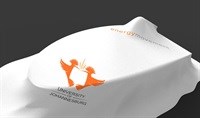
The project, designed to assist students in becoming industry ready by working with multi-disciplinary teams and industry partners, is managed by students from start to finish, including budgets and sponsorships. Fundraising drives by the Team together with academic and administrative support partners from UJ and Resolution Circle have resulted in 25 industry partners already putting their weight behind the team's green technology drive.
Says Mechanical Engineering Science lecturer and academic, Nickey Janse van Rensburg: "The Sasol Solar Challenge is a platform to foster research in alternative energy and fuels, to develop local expertise and encourage industry participation and community engagement on environmental issues. Based on collaborative partnership and participation, Ilanga II has fast become an international brand, highlighting the institution's global excellence and stature, multidisciplinary approach to teaching, incorporating ideas and expertise from the fields of management, art, marketing, industrial design and engineering. UJ has also broadened its reach by incorporating the skills of international engineering exchange students."
UJ Solar Team spokesperson and Project Manager, Warren Hurter is a MEng degree student focusing on research that supports the UJ Solar car build. Warren says: "The 2014 Sasol Solar Challenge is not just a race, the endurance challenge is focused on the longest distance covered, time, maximum speed and solar energy generated. The pre-release of the shape of the vehicle is merely a teaser of what is yet to come. Ilanga II echoes values of aerodynamic success and high performance. We are more than ready to take on our international and local competitors and will continue to focus heavily on our energy reduction race strategy, competitive edge and reviewing market research. A considerable amount of time has been spent considering aerodynamic drag, the electric and mechanical system, solar array and mass rolling resistance in conjunction with Federation Internationale de l' Automobile (FIA) Regulations. The car's striking graphics reflects its audacious, aggressive character and design which is in keeping with UJ's futuristic vision: Rethink. Reinvent."
The suave design of Ilanga II will officially be launched at the University of Johannesburg in July, ahead of the pre-qualifier race in August 2014. In the interim, students across the University have joined the fan club - the UJ Solar Society - which already counts more than 300 undergraduate and postgraduate members - and signed up for try-outs to be one of the four relay drivers.
Faculty of Engineering and the Built Environment (FEBE) Executive Dean, Prof Saurabh Sinha concludes: "The Faculty is in support of the UJ Solar Team's proactive participation and we are confident that the new design coupled by innovative engineering will outdrive our international and provincial competitors in the endurance challenge."
He adds that the support generated from the challenge had also sparked great interest in the international World Solar Challenge in Australia and the Shell Eco-marathon in Qatar, both in 2015.
FEBE is currently putting together a team that will work on designing and building 'Nano', a smaller electric vehicle to participate in the latter.
"The Faculty is driven by active research and it is intellectual engagements like these that continue to heighten the student experience and add greater value to national and global community engagements." said Sinha.
"As an institution of higher learning we are also focused on commercialising patents through Resolution Circle, UJ's specialised technology research and development centre. We strongly believe and have proven that energy innovation can result in technology development, technical education, commercialisation, increase energy efficiency and a decrease in our carbon footprint."
For more, go to www.solarchallenge.org.za